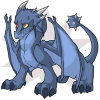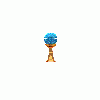Hi,
If you already started to develop a game, you probably know this for yourself.
At the beginning, you're inspired, full of energy and motivation to make a great make.
Then comes the work, and it starts nicely, you see it progress quickly, you're getting forward and you are happy. Then, there is this, and that, and the work piles up, more and more. As the weeks and month pass by, it seems progress is always slower and slower. Developing the game seem to transform in a never ending task that becomes always more of an effort. So you push yourself a little more, and more, until your motivation gauge seems depleted. Not only that, but finishing it still seems so far away!
Then come the self doubts. ...is the game I'm making even funny? Now that I'm playtesting it for the 100st time, I'm not so sure anymore. Will people like it? Will it be great? Or will it be played by a handful of people, then be forgotten in the ocean of average games nobody cares about? Is all this hard work wasted efforts?
Then you try all possible techniques: making a break for a few days, using a TODO list, breaking in down in small steps, and whatever you can think of. But the root of the problem remains. Your motivation gauge is empty, it doesn't seem to refill, the goal seems still far away and self-doubt is nagging more than ever before. ...it's hard to be a game developer. ;)
What's your take on this?
I guess there is no magical recipe, but how do you do to "refill" your motivation gauge?
How do you deal with a motivation slump and self doubts?
I always end up keeping a few plates spinning in the air at once, when one gets me beat-down, I focus on the others. Pick the low hanging fruit when you need to see some instant progress, and take one step at a time and you will not seem so overwhelmed.
With regards ti self-confidence on design - that's a hard one. Nobody seems to have time to comprehend concepts (run it by someone) at the level of detail that is needed to make a decision as well as the originator. So you have to trust your math and gut. Demand evaluation is the most fundamental risk in a project viability and often is the gamble that either pays off or collapses a business project, more so than technical feasibility assessments. This is because costs can be recouped if demand is sufficient.
years to make & patent. May have been a good idea in the 1950's - I plan to be in the hole for a while on that one, however hoping 3dskydome will be more in line with today's consumers.
Hi,
If you already started to develop a game, you probably know this for yourself.
At the beginning, you're inspired, full of energy and motivation to make a great make.
Then comes the work, and it starts nicely, you see it progress quickly, you're getting forward and you are happy. Then, there is this, and that, and the work piles up, more and more. As the weeks and month pass by, it seems progress is always slower and slower. Developing the game seem to transform in a never ending task that becomes always more of an effort. So you push yourself a little more, and more, until your motivation gauge seems depleted. Not only that, but finishing it still seems so far away!
Then come the self doubts. ...is the game I'm making even funny? Now that I'm playtesting it for the 100st time, I'm not so sure anymore. Will people like it? Will it be great? Or will it be played by a handful of people, then be forgotten in the ocean of average games nobody cares about? Is all this hard work wasted efforts?
Then you try all possible techniques: making a break for a few days, using a TODO list, breaking in down in small steps, and whatever you can think of. But the root of the problem remains. Your motivation gauge is empty, it doesn't seem to refill, the goal seems still far away and self-doubt is nagging more than ever before. ...it's hard to be a game developer. ;)
What's your take on this?
I guess there is no magical recipe, but how do you do to "refill" your motivation gauge?
Stick at it, and if it fails, upload it on a website portfolio, show all your methods and tricks etc. then apply to a game company or something. People seem to be soo obsessed with not becoming a millionaire, famous, killing some AAA game or something (this may not be your case however) they lose track of the fact that they are learning A LOT that is beneficial. Even if you decided for some stupid reason to make a game purely in assembly, if it fails midway you will still have gained enough knowledge for some career.
The best way to fill that motivation gauge is to stop focusing on the what you want the project to give you in the future and start focusing on the present, the current task in hand. As long as you are programming or learning there is no reason to think its a waste.
My solution?
Refactor. Cleaner Code.
Anything that can help insure that whenever you delve in your code, you're able to make a significant increment of functionality.
When you keep your code clean, and your mind sharp, there's always a way you can quickly make a noticeable change.
If, on the other hand, your code is messy and/or you're not consistently coming back every day, the obstacles pile up and attempting to add more into your project can lead you on long tangents.
My personal work ethic is to spend 5 days developing, 1 day refactoring, and 1 day off.
The TODO list works wonderfully for me :) and my motivation is untarnished.
My current story is actually very different. I started designing a game, just some clever device that set it up to make a new experience, then I decided this was already too advanced. In the need to implement specific features I designed an even smaller game, which I'm developing. I think of my current progress in terms of two or more games now. No time is ever wasted. In retrospect, I doubt everything before I start to do it.
The TODO list works wonderfully for meand my motivation is untarnished.
It's a good idea to remember this isn't all self sacrifice and try to treat yourself with visual aides. A 'todo' list is good if you feel like continuing but can't remember how what you've done fits together, or what's next. Even keeping a 'done this' list can be interesting, you can see what it'd be like to repeat what you've accomplished in a span of days or weeks. It's all for me, the creator. It is a means to an end. Later I can burn or compress what I don't need and keep the results.
I've read about the idea guy. It's a serious misnomer. You really want to avoid the lazy team.
It's a good idea to remember this isn't all self sacrifice and try to treat yourself with visual aides. A 'todo' list is good if you feel like continuing but can't remember how what you've done fits together, or what's next. Even keeping a 'done this' list can be interesting, you can see what it'd be like to repeat what you've accomplished in a span of days or weeks. It's all for me, the creator. It is a means to an end. Later I can burn or compress what I don't need and keep the results.
I wasn't very into trello before, but I must confess I've had a great experience using that. The way you can just scratch items of a list within a task, and just break it down into manageable chunks really helps.
My TODO for my latest combat system started as a list of 10 items in a single list, and expanded in 5 different lists, each with over 25 items. Yet, I've never felt like I had to 'reorganize' my tasks, as they were always visible, and I could just drag them to the top if I believed this was the next logical step for me.







